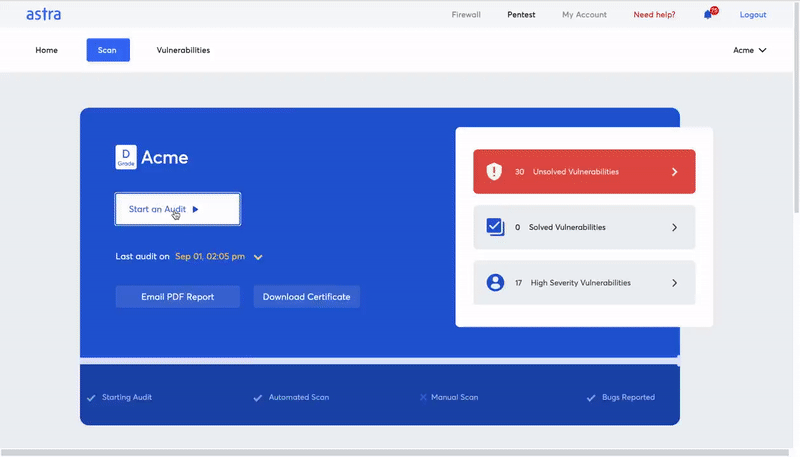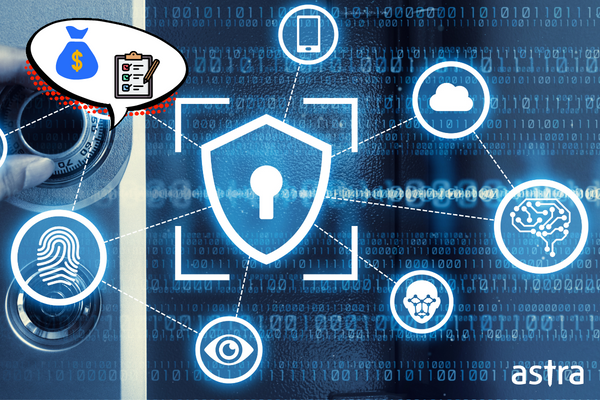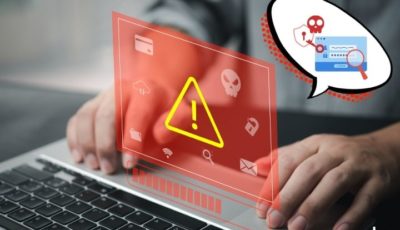When it comes to vulnerability assessment, one of the most important decisions to be made is how much you’re willing to spend. So, how much does a vulnerability assessment cost? Depending on your needs and the vulnerability assessment provider, vulnerability assessment cost range from $999 to $4500 yearly but this can vary quite a bit.
What exactly are these factors that cause the variation in the price of a vulnerability assessment, and why can’t you just grab the cheapest one you can get? We’ll discuss all of that.
The 3 most important factors that come into determining the cost of vulnerability assessment are as follow. You can click on them and jump right to the point where we discuss the qualities that bring up the price.
- The vulnerability scanning tool
- The vulnerability assessment report
- The quality of remediation support
Why is it important to choose the right vulnerability assessment provider?
Vulnerability assessment is a regular process that directly affects the well-being of your business. So, above anything else, it has to be easy. If you are stressed about the vulnerability assessment process, you might eventually stall it and pay for the consequences.
The right vulnerability assessment partner gives you an easy way of monitoring the vulnerabilities. They assist the remediation process and help you put the whole thing on autopilot. Once you are settled with the VAPT provider, you wouldn’t want to change the good thing. So, it is imperative to choose the right one the first time.
Why is Astra Vulnerability Scanner the Best Scanner?
- Runs 8000+ tests with weekly updated scanner rules
- Scans behind the login page
- Scan results are vetted by security experts to ensure zero false positives
- Integrates with your CI/CD tools to help you establish DevSecOps
- A dynamic vulnerability management dashboard to manage, monitor, assign, and update vulnerabilities from one place.
- Helps you stay compliant with SOC2, ISO27001, PCI-DSS, HIPAA, etc.
- Integrates with Slack and Jira for better workflow management
- Trusted by the brands you trust like Agora, Spicejet, Muthoot, Dream11, etc.

Factors for Vulnerability Assessment Cost
When you think about investing in a vulnerability assessment, you think about the ROI. Why shouldn’t you? It’s a business that you are running after all.
However, when you are taking things like quality of risk assessment and ease of management into account, it becomes difficult to predict a tangible ROI or to judge a vulnerability assessment provider based on the cost to your company.
We will try to get a better grip on this by discussing the 3 main factors that contribute to the vulnerability assessment cost.
Factor #1: The vulnerability scanner
The vulnerability scanner plays a pivotal role in your vulnerability assessment effort. It is an automated tool that is used to find vulnerabilities and loopholes in your IT infrastructure.
It probes your system and analyzes the responses based on a vulnerability database to detect accurate signs of a vulnerability.

Check Out: An Intruder Alternative that’s Miles Ahead
What makes a vulnerability scanner awesome?
You can judge the performance and effectiveness of a vulnerability scanner from many different angles but there are some universal features that can help you set a yardstick.
Regularly updated scanner rules: The cyber threat landscape evolves continuously and so should your vulnerability scanner. VAPT providers that update their scanner rules regularly stay ahead of the curve.
Coverage of all major CVEs: Be it OWASP top 10, or SANS 25, your scanner should cover all major CVEs and go beyond that.
CI/CD integration: An awesome vulnerability scanner should be easily integrable with your CI/CD pipeline so that you can enjoy features like continuous vulnerability scanning.
The vulnerability management dashboard: You will be assigned a vulnerability management dashboard by a lot of VAPT providers, but are all of them created equal? No.
You need a vulnerability management dashboard that’s truly interactive – you should be able to interact with security experts to solve your issues if need be.
The dashboard should allow you to assign, monitor, and update vulnerabilities without toggling between a lot of pages. It should replace long email threads.
Read also: What is Continuous Penetration Testing?
Factor #2: The vulnerability assessment report
The vulnerability assessment report is the most important piece in the entire scheme of things. That document would determine the success or the failure of the endeavor.
Now, if the report is unnecessarily long, excessively complicated, or some kind of jargon fest, it’s not going to be easy for you to find the necessary insights.
What makes a vulnerability assessment report actionable?
A report should trigger action, that is its sole purpose. And in order to be actionable, it needs some qualities.
Categorization of vulnerabilities: The ideal report should categorize the vulnerabilities not only based on their CVSS score but also on the risk posed by them in that specific context.
A clear summary for everyone to understand: Security is a niche area of engineering. A report should be created keeping people with no security acumen in mind. It should be simple enough to be consumed by all, and comprehensive enough to direct the action.
Remediation guidelines and PoCs: The ideal vulnerability scanning report should contain detailed guidelines for the users to reproduce and remediate the vulnerabilities. Some companies go the extra mile and add video PoCs to make it even easier for the developers.
Factor #3: Remediation Support
The ROI on your vulnerability assessment venture depends on how well you are able to fix the issues found by the VAPT provider and whether or not you are able to mitigate the risk posed to your business. This is a segment where a handful of VAPT companies are miles ahead of the others.
We have already talked about remediation guidelines and video PoCs being included in a vulnerability assessment report. But what if it is not enough? Does the VAPT provider take the onus to help their customers out through human participation? We know one company that does. We will talk about it later.
By now, you know what contributes to the vulnerability assessment cost. You also know what to look for when you are trying to compare a bunch of VAPT tools. We will talk about a solution that trumps most of its competitors by a mile in all of these categories, just to help you get a well-defined line of reference.
Vulnerability Assessment by Astra Security
Astra’s pentest platform is the ideal vulnerability assessment and pentest tool for any industry.
Astra’s Vulnerability Assessment and Penetration Testing Pricing
| Scanner | Pentest | Enterprise |
|---|---|---|
| $1,999 per year | $ 5,999 per year | $ 7,999 per year |
| Weekly Vulnerability Scans | Unlimited Vulnerability Scans & 1 Manual Pentest | Vulnerability Assessment & Pentesting by Security Experts |
| 9,300+ Tests | Integration with CI/CD Tools | Cloud Security Report |
| Pentest Dashboard, Scan Behind Login | Zero False Positive Assurance | Publicly Verifiable VAPT Certification |
| Free trial for 7 days | Everything in the Scanner Plan | Everything in the Pentest Plan |
Let’s look at the scanner first
- The scanner rules are updated every week which is more often than any other company
- The scanner integrates easily with GitHub, GitLab, Jenkins, Slack, and Jira. You get continuous pentesting with an unhindered workflow.
- The vulnerability management dashboard lets you monitor, manage, assign, and update vulnerabilities. On top of that, it shows you vulnerabilities that block your desired security compliance. There’s more. You can use the dashboard even to control the Astra Website Protection product.
- With 8000+ tests, it covers all major CVEs. The scanner has been astonishingly adept in detecting emerging vulnerabilities as well.
- It scans behind login pages without requiring reauthentication.

Now, the report
- Segmented report for executives and developers
- Categorization with accurate risk scores
- Step-by-step remediation guidelines
- Video PoCs for reproducing vulnerabilities
Finally, the remediation support
Astra’s vulnerability management dashboard comes with the option to request help from security experts if you are stuck with a certain vulnerability.
From the same dashboard, you can chat with an expert about your issue – there’s a provision to share resources to explain the issue at hand better.
If that doesn’t work you can even get on a call with an expert to fix the issue. This is a feature only Astra Security offers, and that too without any additional cost.
FAQs
What is the minimum vulnerability assessment cost with Astra pentest?
Astra pentest starts at $199 per month.
What are the USPs of Astra’s vulnerability assessment?
Continuous scanning with CI/CD integration, contextual collaboration, free rescans, and the widest possible coverage of CVEs.
Who should opt for a vulnerability assessment?
Any digital business trying to stay secure from cyber attacks should opt for a vulnerability assessment. It is essential for businesses working with sensitive customer data.
















